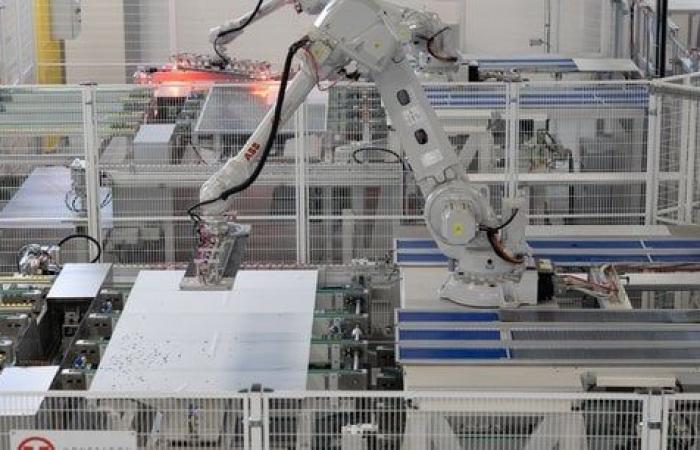
« Reindustrialization is still underway », insisted the resigning Minister of Industry Marc Ferracci during a trip to Toulouse in mid-November for Industry Week. However, the figures demonstrate a turnaround in French industry in recent months. According to the latest study by the firm Trendeo, a specialist in industrial investment, factory closures were more numerous than openings, with a difference of 15. Far from the record for the year 2021 where the net balance of openings of factories stood at 129. “ This is the first time since 2015 that this indicator is negative », underlines David Cousquer, founder and director of the Trendeo firm.
Is the industry destroying jobs near you?
Is the reindustrialization dynamic already behind us? There is no doubt for the CGT, evoking a “ rampant deindustrialization », based on a map produced in-house. This lists 286 social plans approved since September 2023, throughout the French economy. The union is even calling for a national mobilization this Thursday, December 12 to warn of the emergency situation surrounding the industry.
According to a map produced by the editorial staff of The Tribune and unveiled today, around a hundred plans for job cuts and factory closures have been identified in French industry since January 1, 2024. According to this count, nearly 13,000 industrial jobs have been destroyed over the last twelve months, and more than 4,000 who are weakened. Of course, this count is not exhaustive, the editorial staff having only taken into account social plans with more than 50 jobs…
“Behind these social plans, behind these falling trees, there are forests growing in the territories. Since my appointment as general secretary for investment, I have visited 55 departments. Each time, I am presented with a multitude of economic projects, there are plenty! These entrepreneurs lack the resources to increase their turnover. They are not bothered by the motion of censure, they are bothered by all the standards and regulations in force,” says Bruno Bonnell, head of the France 2030 plan, which supports business investment in technological innovations.
“The pause button”
This enthusiasm contrasts with the indicators and feedback from the field observed in recent weeks: the latest quarterly barometer from Banque Palatine and the Movement of mid-sized companies, unveiled in mid-November, estimates that 33% of mid-sized companies are considering a temporary freeze of their investments and 65% of those are anticipating a reduction or suspension of their recruitment. This same The barometer had already warned of the paralysis of leaders in terms of investments following the dissolution and governmental instability in September. The recent motion of censure has certainly not reassured the industrial world.
“It’s as if the industrial fabric had pressed the pause button in recent months… The industry needs stability, project leaders need to know where they are going to invest. Summer is often a good time for investors to make contact with local authorities for land. Every summer, I have three to four files on the table. This summer, I haven't had any calls! Investments cannot materialize in such a climate,” says Sébastien Martin, president of Grand Chalon and president of the Intercommunalités de France association.
Reindustrialization: why is it stuck?
As proof, the recent posture of the Safran group. The latter is considering the location of its future carbon brake factory between France, the United States and Canada. Beyond the price of energy, a central subject in this type of project, the leaders do not hide that the local political situation will also influence their decision. This investment of 400 million euros could thus escape France even though it was initially planned for the Lyon region.
“France is not a country of large factories, its strength is its granularity. Employment will be in local SMEs and ETIs, experts in particular and specific fields. We have identified 5,000 economic development projects in local businesses (…) I hate the word reindustrialization. I am not sure that this will bring many jobs in an era where factories are ultra-modern and robotic,” says Bruno Bonnell.
One million retirements: the challenge for French industry
The business climate still remains a real thermometer of the economic fabric. The business law firm ARC, in partnership with Ifop, surveyed 500 companies during the month of October and has just revealed the results of its barometer which leaves room for skepticism. 94% of them (i.e. +6 points compared to 2023) think that the economic situation will not improve over the next six months and they are even more than half (52%, up 8 points compared to 2023). one year) to predict its deterioration.
“Deindustrialization is unfortunately underway. We see this through the utilization rate of industrial production capacities which has fallen to 75%. When the industry is operating normally, this figure is at 83 or 84%,” declared Patrick Martin, the head of MEDEF, in the JDD of December 8, who is hoping for a political boost in the short term.
Need a political response
To reverse the trend, the response will necessarily be political. The hoped-for return to a form of government stability will restore confidence in markets and manufacturers. But the question of the competitiveness of French companies also arises. “ Our social protection system represents 47% of state spending and we are placing this burden more and more on work. If we want to regain competitiveness in our businesses, this necessarily requires a profound reform of our social protection. », Judge Sébastien Martin, very involved in this question of reindustrialization.
“We liquidate, it’s over”: in Bordeaux, the commercial court is saturated
Regarding the France 2030 plan, only 35 billion euros out of the 54 planned have been committed to date, which leaves room to support entrepreneurs. For the rest, the vagueness remains, like this amendment of 1.55 billion euros to decarbonize industry, planned in the PLF 2025 and since abandoned. Same fate for the industrial savings book that the resigning Prime Minister, Michel Barnier, carried for a few weeks to use the record outstanding amount on the Livret A to support the country's industrialists. What future also for the exemption of future factories from the ZAN law?
Barnier exempts industrial projects from zero net artificialization (ZAN)
“We have no industrial land problem in France. To date, we have more than 700 sites available, in the hands of public authorities, which represent more than 6,000 hectares, not including wasteland. There is, however, a phenomenon of scarcity on land larger than 20 hectares, it is true. However, we do not feel a dip for the moment, we who intervene very downstream of the files for the real estate part of the factories. Maybe we will hit the bottom of the wave later,” notes Olivier Sichel, deputy general manager of Caisse des Dépôts and boss of Banque des Territoires, which plans to invest one billion euros by 2027 in industrial themes.
Despite a dark year in 2024 for the reindustrialization of France, everything is not to be thrown away. According to the Trendeo firm, the country can rely on a positive balance of factory openings of +316 between 2016 and 2024. Furthermore, an INSEE study reveals that France has 310.000 establishments economically active in themanufacturing industry, at the end of 2022, compared to 240,000 in 2014, although this growth is mainly driven by micro-entrepreneurs.
Industrial projects: India and the United States explode the meters





